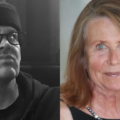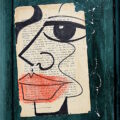Conversations: Jennifer Barber and Leslie McGrath

In 2015, I was invited to join the board of Salamander Magazine, founded and edited by Jennifer Barber. This year marks her last year as editor, as she turns to other work (more on that below) and the magazine gains a new life as an organ of Suffolk University.
It would be easy to praise Jennifer’s many strengths and virtues—the keen intelligence, the careful attention, the breath of her sensibility—which manifest in her own writing and in her calling as editor. But I’m confident that other people, who have known her longer, who have deeper insights, will undoubtedly offer that praise.
Let me instead draw attention to the phenomenal accomplishment she has achieved as the founding editor of a multi-decade literary institution. As any editor will tell you, literary journals are hard to launch. They’re hard to maintain. They often fold after a few years or a few issues. Upon the exit of a founder, they rarely gain the independent existence Salamader has now with Suffolk University.
Jennifer Barber’s leadership and vision cannot be understated. She has done so much for the literary arts—with more yet to come!—and I am grateful to feature this conversation between her and fellow poet-editor Leslie McGrath.
—Daniel Evans Pritchard, Editor
Jennifer Barber: Leslie, although we have only met a handful of times, we’ve come to know each other over the years both as writers and editors.
I’ve published poems by you in a few different issues of Salamander—poems that I’m delighted to see in your recent book, Feminists Are Passing From Our Lives—and we were in frequent touch in 2015 after you chose my book Works on Paper from an anonymous pool of manuscripts submitted for The Word Works Tenth Gate Prize, a series that you initiated in 2013 for mid-career writers.
I’d like to discuss how you see the connection between being a poet and taking on editorial work, such as screening manuscripts for publishers, judging poetry contests, and running the Tenth Gate series from 2013 to 2018. I’d also like to make some observations and ask you some questions about the poems in Feminists Are Passing From Our Lives.
To start, when did you decide to pursue poetry? Who were some of your first teachers?
Leslie McGrath: I came late to poetry, at forty. I’d always loved it, read and wrote it, but I was a psychology and Spanish major in college, with the intent of becoming a clinical psychologist. The only lit courses I took were in Spanish, but oh were they important to me. I read a lot of Spanish, Mexican, South and Central American poets. Lorca, Vallejo, and the generación de 1898 moved me deeply.
I wrote my poems in Spanish until I was in my thirties and my fluency began to fall away. As a relatively privileged white American who grew up in the second half of the twentieth century, I didn’t think I’d ever be faced with the kinds of injustice and violence my favorite poets had written about so well. But I was wrong. Now I see these influences as well-suited to our time.
I went to Bread Loaf as a participant in 2002 and was in Tom Sleigh’s workshop, where it immediately became obvious I’d need an MFA in order to carve out the time I needed to learn prosody and get a start on reading English language poetry. I entered the Bennington Writing Seminars in 2003 and as luck would have it, studied with Jane Hirshfield, who remains extremely important to me as a poet, a scholar, and a good human being. We’ve built friendship and trust over the last fifteen years.
As an editor, you were both encouraging and professional, which I don’t think is easy to do. Would you tell me the story of Salamander’s beginnings? What were your hopes for it within the rich literary atmosphere of Boston?
JB: Although I grew up in the Boston area, I had been away for many years before I returned with my husband, Peter Brown, and our infant son Jeff, in 1989. I got around to starting the magazine in 1992. I knew that Boston was an intensely literary city, but since I hadn’t gone to college or graduate school in Boston, I was somewhat out of the loop.
Salamander was partly a way to keep current with work that friends of mine from graduate school in New York were writing while also spreading the word more generally, with the aim of getting more submissions from exciting newer writers who were just beginning to publish and who would benefit from having more of a readership.
In 1992 there were fewer women editors of literary journals than there are today. I had the idea that there’d be an opportunity to give a fuller expression to women’s writing than might be found in other journals.
What kinds of editorial work did you do before Tenth Gate? How did such work influence you as a poet, if it did?
LM: I worked with the former literary magazine Drunken Boat for three years, starting as a poetry reader and eventually becoming the managing editor. My first task was to read through two years of submissions in every genre that had gone without reply. Thousands of submissions. I sent apologies to hundreds of writers and encouraged many to try us again. It was an apprenticeship by fire.
In 2008 I had the opportunity to edit Reetika Vazirani’s posthumous poetry manuscript. I’d read and was very moved by her first two collections. The manuscript was not polished (some poems were still being revised; others were handwritten), but Reetika’s poems were unlike any I’d ever read: very dark, sometimes satiric, and exploring her identity as an Indian American woman.
Editing and then publishing her last poems, Radha Says, was a turning point in my own work, a kind of permission-giving to write honestly of my own anger and complicated feelings about my history of depression.
When I read your second collection, Given Away, I was struck by the rigor and delicacy of your poems, and how they were very much in keeping with your editorial personality. Words like “elegant,” “restrained,” and “precise” have been used to describe your poems. They’d also work well in describing you as an editor.
How did you learn the ins and outs of running a literary magazine?
JB: I do feel a connection between what I think about in my own poems and what I look for as an editor. When selecting work, it’s always good to see “risk, originality, and daring”—a category gymnastic judges in the 1970s and ‘80s used to cite when scoring a performance—but I am also interested in qualities such as subtlety, nuance, understatement, and tact—this last being hard to define, but having something to do with the writer’s ability to trust the reader to intuit what hasn’t been said explicitly.
Selecting work for Salamander has always been a team effort: our poetry editors have included Don Share, Jacquelyn Pope, and our current poetry editor, Valerie Duff-Strautmann. I’ve depended on each of them for conversations about individual poems—their techniques, their aesthetics.
As for the ins and outs of running a magazine, I was helped by my professional background as a production editor. Production editors usher a manuscript through the various phases—editing, copyediting, typesetting, proofreading, printing and binding—that result in the finished product.
Leslie, I want to ask you about balance. Each of us has to manage competing needs at different times in our lives, which may include raising a family; earning money; finding time to do what you most feel called to do. How did this play out for you in your twenties, your thirties, your forties and beyond?
LM: I’d been completely focused on a career as a clinical psychologist in my twenties. I earned a master’s degree in research psychology at Wesleyan, then was two and a half years into the doctoral program in clinical psychology at NYU when I learned I was pregnant. It was the mid-eighties. I was told by the psychoanalysts at NYU that I had to take at least a year’s sabbatical.
One year turned into five and by the time I felt ready to return, the advent of managed care had begun to change the practice of psychotherapy (especially the psychoanalytically oriented psychotherapy I was training in) utterly. I floundered for several years, got divorced, moved to a place where I knew no one, and started again.
Poetry was waiting for me then. The poem “Litany,” which you published in Salamander to my great joy, is the story of those years. My forties, fifties, and now my sixties have been spent in poetry: reading it, writing it, teaching it, judging it, and marvelling at it.
I came to know your work through Given Away, and was particularly moved by the poems that use psalms as their inspiration. I’m thinking of “Orchard,” “God Doesn’t Speak in the Psalms,” and “In the Hebrew Primer.” They speak of a private journey through these ancient texts toward a contemporary personal identity.
This journey has evolved in Works on Paper; it’s broadened to include love of others and focused more on specifically Hebrew texts. Would you talk about this?
JB: I was raised in a secular household, with no exposure to Judaism except what I gleaned secondhand from my friends, so my identity in that regard is a work in progress. It’s not something I’ve ever been able to take for granted.
In my first book, Rigging the Wind, I wrote several poems about Judeo-conversos in medieval Spain. The forced or willing conversion of some Jews to Christianity, and the preservation of Jewish rituals and identity on the part of others, helped me deal with my own first uneasy steps of claiming a connection to Jewish culture and history.
In Given Away, I was further along in feeling that personal connection and really immersed in reading the Hebrew Bible. I didn’t aspire to retell biblical stories but I couldn’t resist drawing from and reacting to some of the amazing imagery in the psalms and the prophets. “In the Hebrew Primer” is my attempt to express both the nervousness and excitement I felt at learning Hebrew.
LM: I see that Given Away has been translated into French by the poet and translator Emmanuel Merle. How did this come about? Were you involved in the translation process?
JB: My husband translated into English a collection of poems by Emmanuel Merle, who is based in Grenoble, called Elsewhere on Earth (the French title is Amère Indienne), poems about Merle’s travels through the American West. Peter and Emmanuel have continued to work together, along with Caroline Talpe, a French native based in Boston. They’ve recently been collaborating on translating American poetry into French, including a volume of selected poems by David Ferry (Qui est la?).
While Emmanuel was translating Given Away into French (as Délivrances), we corresponded back and forth, resolving questions. My husband and I are currently translating another book of Emmanuel’s into English (Ici en exil), and we hope to continue this French-English/English-French literary relationship in the years to come. Additional projects are being planned.
Leslie, you’ve said that starting the Tenth Gate series had to do with understanding accretion—the idea that a poet’s work undergoes significant change over the course of multiple years and books. Can you say more about this? Did you find that most of the focus of small publishers at the time was on contests for first books? Did you draw on your own experience in seeing the need for a midcareer contest? How did it come about that this series found a home at The Word Works?
LM: I’m a deep diver by nature. When I read a poet who interests me, I go back and read everything they’ve written and every interview. It’s a great way to get a picture of who they are as writers, their choices along the way, the periods in which the work seems stable, the periods where they break through to new techniques and subjects.
I’d seen this kind of evolution in Jane Hirshfield’s work and we spoke about it at length, which was very helpful to me during the times I’d despaired about stagnation and dead ends in my own work.
I had a very difficult time placing my third collection. Years of submissions to small presses, many of which had first book contests. And there are prizes, thank goodness, for the old soldiers, like the Ruth Lilly, that celebrate a poet closer to the end of her career. But there seemed to be a lacuna for midcareer poets, those who continued to write and publish after the first and the second book.
Poetry is so difficult and it takes years, often decades, to develop fully. I think poets’ third books hold a poet’s mature work and I wanted to provide a publishing opportunity to honor their arrival at this place. When Nancy White, President of The Word Works, heard me complaining seven years ago, she challenged me to start the contest and the imprint at The Word Works. For five summers I read nearly a hundred full-length poetry manuscripts before selecting a winner.
I’m very proud of the five collections that have been published so far, your Works on Paper among them! The name for the Tenth Gate Prize came from Jane herself, an amalgam of Nine Gates and Ten Windows, her two books of essays.
Since the publication of Works on Paper, what direction has your writing taken? Has it continued along some of these lines? Have new veins presented themselves? And how deliberate are you when it comes to writing your poems, meaning do you set out with an idea and follow it or let the poem take you over?
JB: To try to answer this question, I’m spreading some of my newer poems across my desk to look at them as a group, which I haven’t done previously (I am still in the early stages of a next collection).
Several are about the absence of particular people, absence as a kind of presence, a kind of reverberation. Others use forms of direct address to talk to natural elements: “To a Pear Tree,” “To a Seedpod: Questionnaire,” “To the Wind.” Images from Ezekiel—the prophetic book that includes some of the most fantastically strange visions of all the prophets—have made their way into a few of my poems: mourning as an altered state.
Usually, when I begin writing a poem, I have something specific in mind that I end up letting go of during the process as something else emerges. The “something else” might be close to the original intention, but never exactly it.
You have a poem in Feminists Are Passing From Our Lives called “Rejection Season” which takes on the vagaries of this process—the surge of hope when sending out, how one experiences the rejections that all writers face, the relationship of publication to confidence. As an editor yourself, do you see editors as gatekeepers, a necessary (or unnecessary) evil?
LM: As an editor, I know well the vagaries of selection, which should make the inevitable rejections that come my way a bit less painful. And most of the time it works, but I go through periods of nothing but rejection and periods of not writing well, or at all.
That’s when I remind myself that a writer doesn’t just write and publish, she teaches, she supports her friends, she reads, she lives her life. I have no control over who accepts my work and who reads me, no control over their opinion of the work. My job is to write and to be a decent and kind person. I know that sounds very elementary, but that’s what wisdom is.
This brings me to a subject with which I’ve been preoccupied: what is the obligation of the poet toward speaking about the injustice and cruelties of her time? We’re living in a time of cultural violence toward immigrants, women, and Jews. How do these cold winds affect your life and work?
JB: To address the life part first: like so many, I’m extremely worried—appalled—at the path our country is taking. I believe that all of us, as citizens, have an obligation to speak out about the injustices and cruelties we see.
I’d hesitate, however, to say that a poet must write about certain subjects at certain times.
For myself, I tend to have a slow germination process, so when I do address current events, often a substantial amount of time will have passed between the event and the poem. To gain another kind of perspective on things happening now, such as the increase in hate crimes—some symbolic and some resulting in murder—I’ve returned to writing about Spain, in particular the years 1391 to 1492.
If before I was partly looking for my own identity in thinking about the conversos, this time I’m attempting to understand how the mechanisms of prejudice can intersect with changing political winds to disastrous effect. I’m haunted by the thought that different groups of people can get along well until it’s in someone’s interest to goad them into enmity.
I am fascinated by your poem “All the Goats.” What was the impetus for this poem—is it based on history or legend? Does it pertain to New England Puritans? In general, would you say your poetry is strongly influenced by your location in the historic town of Essex, Connecticut?
LM: I’m so happy that you’re moved by “All the Goats”! A few people have said the poem feels ominous, but that wasn’t my intention. Much of the work in Feminists is focused on mental health and mental difference. “All the Goats” tries to address the worst kind of stigma: that of ostracism by family.
When I started reading about scapegoating, I was struck by the fact that people once believed that their sins could somehow be transferred onto other beings, who would carry their sins away. It’s straight from Leviticus. But if you think of it from the perspective of the goat, who knows nothing of sin, family is family and home is home, no matter what others feel about you.
I was born in CT and have lived along its coast all my life. I’ve written poems about its rivers and small islands, and my southeastern CT geological obsession, it’s dry stone walls, which are as close as I’ve ever gotten to miracles. I’m now trying to write about some of its psychology—the curious beliefs New Englanders have about money and drinking, and how we ignore each other out of politeness in the service of privacy.
In your poem “Five Starts” the reader is whirled through five distinct feeling states. There are few words on the page, but their placement is powerful, unifying. Would you talk about your writing and revising processes when it comes to achieving the beautiful spareness of your poems?
JB: I had five openings—five first lines—to poems that I’d abandoned for lack of figuring out where they might go next. But I still liked the openings.
I began to see that the openings could lead into one another from across the white space between them. While I was working on the first three “starts,” we got the news that my father was suffering from a terminal illness. Starts 4 and 5 are about that and having them there perhaps worked retroactively on 1-3, which are more daily and incidental.
My process frequently involves subtraction. It sounds counterintuitive, but for me taking things away can be a way to elaborate.
LM: I love “taking things away can be a way to elaborate.” I find it to be true as well, maybe because it nudges both writer and reader to give more weight to the visual and sound elements of the poem. How do you think it works so well?
JB: One of my aesthetic hopes is that the reader will meet me halfway, and allowing more space, leaving more to suggestion, might increase the chances of that happening. The idea of being met makes me feel less lonely inside a poem.
As you noted earlier, mental illness is a topic in Feminists Are Passing From Our Lives, in poems such as “Fearing the Mad,” in which there’s a refrain built on the public’s fear of living among the mentally ill; “Two Poles and a Suicide,” which explores the life and death of Reetika Vazirani; and poems that describe your own struggle. I am wondering about the challenges you faced in taking on this subject, which is still so taboo, connected as it is to the deep fear people have of losing control over their own lives.
LM: More than twenty-five years ago, while in a locked unit of a psychiatric hospital under suicide watch as I began to remember some of the more traumatic parts of my childhood, I received a diagnosis. It was one of those moments when you know your life would never be what you had planned it to be. I felt such shame. I knew I’d never have the confidence to finish my doctorate in clinical psychology.
I knew that no matter what I lost, and I lost a great deal in the ensuing years—my vocation, my marriage, and custody of a daughter—my imagination was a gift that would stay with me. And I wasn’t alone in this. Other patients I came to know during my year of hospitalization, and those I’ve met since who live with mental difference, often have the most extraordinary sense of humor, insight, and creativity. They’re my people. I write about them and for them. They’re the people I most admire.
It took me ten years to feel as though I had the emotional framework and the skills to be able to write about the mentally different without being defensive or gilding over the suffering. It was important to me to write some historical poems (“Brotherhood and the Straitjacket” and “Dr. Burckhardt Performs the First Lobotomy: Switzerland, 1886”) that honor the care and creativity of people who work with the mentally different. And I wanted to address stigma, the gift that keeps on taking. These poems took me ten years to write over many many drafts.
JB: The last poem in your recent collection, “A Music,” is imbued with a strong sense of belonging to something larger than the self—a sense of spiritual rootedness and hope. Can you say what, in the poem and in life, allowed you to attain this state of mind? Or is something you aspire to? How do you view the relationship between the spirit and the creation of poetry (“music”)?
LM: The imagination is the way we touch God. And the music of my imagination is my poems. I think, out of all my poems on mental difference, “A Music” is my favorite. It taps into the imagination as a source of hope, and it does so joyfully.
I’ve read that you’ve recently retired. I know you’re no longer teaching at Suffolk University and have stepped down from Salamander, but I have a feeling the word ‘retirement’ isn’t an accurate description of what you’re now doing. And what you have planned.
JB: My big non-plan of a plan is to be able to focus on writing some new poems with less time pressure than before, and to have more freedom generally—to see family and friends, to go to a museum in the middle of the day, to read beyond the confines of a syllabus.
Beyond that, I’m interested in writing reviews of new volumes of poetry and undertaking translation projects in a more sustained way. I’ve also thought about returning to adult-education teaching. I feel like I’ll have a clearer sense of direction six months or so down the road.
Jennifer Barber’s poetry collections are Works on Paper (The Word Works, 2016, Tenth Gate Prize), Given Away (Kore Press, 2012), and Rigging the Wind (Kore Press, 2003, Kore Press First Book Prize). Her poems have appeared in several anthologies and in the Missouri Review, Poetry, Poetry Daily, the Harvard Divinity Bulletin, the New Yorker, December, and elsewhere. A recipient of the Isabella Gardner Fellowship from the MacDowell Colony, Jennifer is the founding editor of Salamander, based at Suffolk University, for which she served as editor-in-chief from 1992 to 2018.
Leslie McGrath is the author of three full-length poetry collections, Feminists Are Passing from Our Lives, Opulent Hunger, Opulent Rage, and Out from the Pleiades. Winner of the Pablo Neruda Prize for Poetry and the Gretchen Warren award from the New England Poetry Club, her poems and interviews have been published in Agni, Poetry Magazine, The Academy of American Poets, The Writer’s Chronicle, and The Yale Review. McGrath teaches creative writing at Central CT State University.





